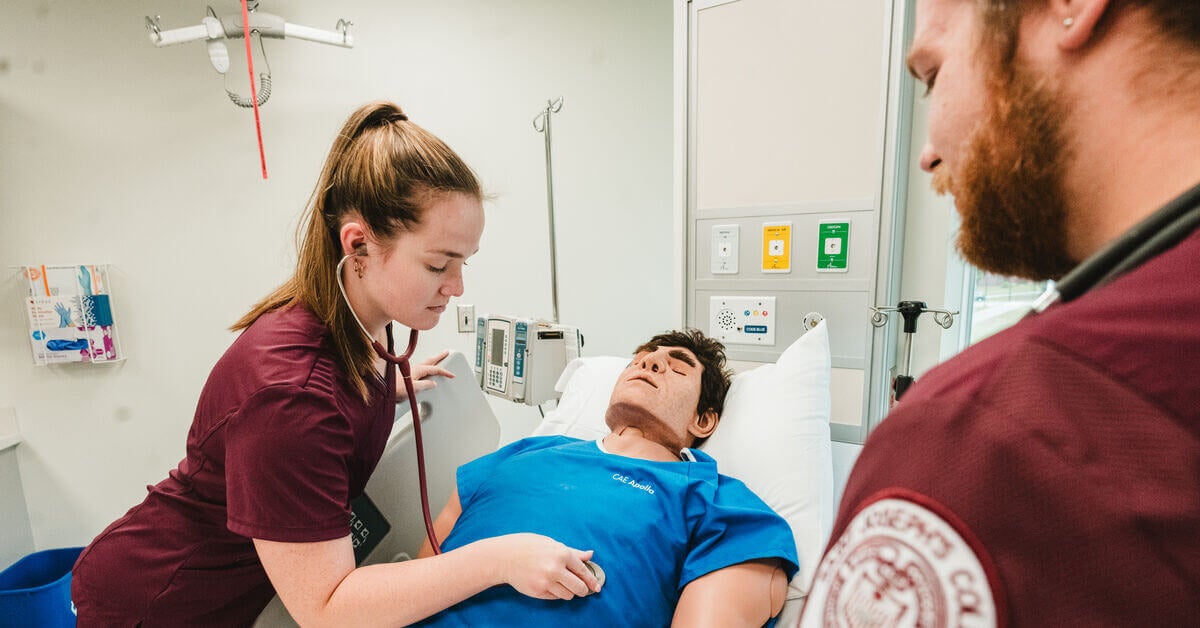What are Nursing Simulation Labs?
Nursing is a patient care profession where clinical learning is essential. Effective patient care is possible when nurses are experienced with critical thinking and are competent in managing the shifts in health status that can happen when caring directly for patients. If you have ever wanted to pursue a nursing career and desire more information about how a nursing simulation lab is used in a nursing educational curriculum, this blog is for you.
Nursing simulation labs allow students to begin to transition from didactic courses to direct patient care while fostering confidence and competency in common and complex health care scenarios. In this blog, we will explore the value of nursing simulation, especially within an online accelerated bachelor of science in nursing (ABSN) program. Nursing simulation labs will immerse you in clinical learning which is beneficial when you find yourself working directly with patients and families.
Note: The term “nursing simulation lab” may refer to an educational lab experience, but it also may refer to the physical lab space consisting of technology for simulated learning.
What is a Simulation Lab?
When you walk into a nursing simulation lab, you see a wealth of technology that has been built to allow the teaching and practice of clinical skills and the application of critical thinking in real-world scenarios. Simulation labs often mimic hospital rooms, outpatient clinics, and other nursing practice settings. Components of a simulation lab include:
- Patient hospital beds
- Simulation manikins of various ages
- Nursing assessment equipment
- Health status monitors
- Supplies for medication administration
- Emergency intervention kits
Hifidelity simulation manikins are complex and intricately functional to allow lifelike responses to nursing interventions. Their health status may improve or worsen, sometimes dramatically and quickly, when helpful or harmful nursing interventions are performed. Simulation labs are equipped with a variety of technological options including the manikins that can engage verbally, respond with physical changes, and even simulate death. Some simulation labs may include lowfidelity manikins that simulate a patient without the hitech responsiveness.
Manikins are different from standardized patients, who are actors that come into the learning environment to play patient roles. Standardized patients may allow students the opportunity to learn and practice specialized areas of clinical care on a real person in a training environment.
Benefits of a Nursing Simulation Lab
The primary purpose of simulation labs in nursing education is to aid in the adequate preparation of students for nursing clinical practice. Additionally, nursing simulation labs create opportunities to practice a large variety of clinical situations that may be encountered during direct patient care clinical rotations.
Benefit #1: Practice Skills in a Safe Environment
Nursing simulation labs allow students to practice their newly learned clinical skills in a safe environment. When there is no risk of harming a real patient, students have permission to make mistakes and learn from them. Removing consequences of patient harm allows a free and secure environment to fully own the patient care responsibility and engage in a variety of scenarios. Specific examples of clinical scenarios that are practiced during nursing simulation labs include:
- Care of patients during seizure activity
- Cardiac/respiratory arrest
- Intravenous medication administration
- Postpartum hemorrhage
- End-of-life care
- Medical complications such as pulmonary emboli
When a student has nursing simulation experience, they are more likely to be prepared for any situation that arises in real-world practice environments.
Benefit #2: Develop Critical Thinking Skills
Critical thinking in nursing education is the ability to evaluate the reason behind why a nursing intervention results in a particular outcome. When an evidence-based intervention does not produce the desired clinical outcome, critical thinking skills can help a nurse determine what to do next. The ability to think on your feet is a skill gained through practice.
Nursing simulation labs force students to solve problems with urgency, such as what to do when the intracranial pressure of a patient is increasing rapidly. The goal of the nursing student would be to evaluate vital signs and act quickly and effectively to reduce the likelihood of severe brain damage or death. This immersive practice helps develop critical thinking skills that you will need to become an effective nurse.
Benefit #3: Gain Confidence
Nursing simulation labs can help students gain confidence in their abilities, which is an important part of success. Instructors are available to provide feedback and guidance for managing stress and making effective nursing decisions in a variety of patient care scenarios.
Confidence is essential for effective nursing care because:
- Those around you including patients and families can sense nervousness and insecurity
- Trust is fostered where there is confidence
- Patients rely on reassurance from nurses and other healthcare professionals
- Positive relationships form with confident and effective communication
- Patients are likely to follow advice and education when presented with confidence
One major advantage of nursing simulation labs is that the environment is typically very similar to a hospital or health care setting. This means that confidence gained in the simulation lab can be transferred to the direct care environment because your surroundings will look relatively familiar to the practice location for your clinical rotations and/or future place of employment.
Benefit #4: Prepare for Clinical Rotations
Clinical rotations are the direct patient care experiences during your nursing education. These precepted experiences where you work directly with a seasoned nurse in a real practice environment are a required component of a nursing curriculum. During clinical rotations, you will be supervised by a nurse and work directly with your nursing faculty to receive clinical instruction and guidance for transitioning your current skills to the real-world environment.
Some of the clinical skills you will practice in a simulation lab include:
- Communication skills for history-taking
- Head-to-toe physical examination
- Clinical tasks such as catheter insertion and removal
- Infection control
Nursing simulation labs help students prepare for clinical rotations. Simulation labs are conducted in a controlled, model environment within a classroom-like setting. Nursing clinical rotations take the skills learned in the simulation environment and apply them in hospitals and other care settings with live patients in a precepted, real-world environment.
After practicing with a simulation, many nursing students are excited and ready to engage with real patients. The confidence gained through a simulation experience transfers to the clinical setting and allows students to grow and get the most out of their direct patient care time while in school.
Tips For a Successful Nursing Simulation Lab
To get the most out of your nursing simulation lab experience, it is helpful to study your clinical skills in advance and take advantage of the opportunity to make mistakes. Recognize that your fellow classmates are also new to this type of clinical learning experience and find encouragement in the fact that you will go through this process together.
Your faculty are supportive and want to help you succeed, and part of the learning process is knowing that you have the freedom to be a student. Celebrate each milestone of clinical growth, relax, and enjoy the time. You will emerge from the nursing simulation labs having gone through complex patient scenarios and witnessed firsthand what can go correctly and incorrectly in real clinical situations. Simulation labs are often unforgettable experiences for students.
In summary, nursing simulation labs are an important part of nursing education because they allow the safe practice of nursing skills so that students can gain confidence and prepare for future clinical practice.
Experience a State-of-the-Art Nursing Simulation Lab at Saint Joseph’s College of Maine
One of Maine’s newest nursing simulation labs just opened on the campus of Saint Joseph’s College of Maine. This state-of-the-art facility houses multiple simulation labs that replicate hospital and home care settings. Students will have the opportunity to learn within these simulation environments during their on-campus immersions. Saint Joseph’s College of Maine has achieved accreditation in higher education for its online nursing program.
If you are looking for a fast track to nursing from your current career, Saint Joseph’s College of Maine offers a compelling option for quick and effective nursing education. The online ABSN program is tailored specifically for those with a current bachelor’s degree in a non-nursing field.
Features of the hybrid ABSN program include:
- 100% online coursework
- Complimentary clinical placement support
- Completion in 15 months
- Two on-campus immersions in the nursing simulation lab
- High pass rates on the nursing practice examination (NCLEX) required for licensure
The nursing program at Saint Joseph’s College of Maine is accredited by the Commission on Collegiate Nursing Education (CCNE). Prior nursing experience is not required for enrollment in this program. You will receive one on one, dedicated support from a student advisor who can help answer your questions and guide you through timely completion.
For more information on how you can get started, visit the program page today.



